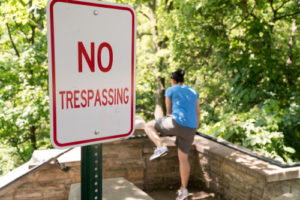Landowner Liability Involving Trespassers In Pennsylvania
July 1, 2020

Typically, a landowner owes a duty under Pennsylvania law, at a minimum, to refrain from intentionally or recklessly injuring a visitor to the property and to warn of dangerous conditions on the property that pose a risk to life and limb. Certain visitors to property, such as customers of a store or restaurant, are owed a higher duty by property and business owners to take reasonable steps to maintain the property and keep it free of dangerous or hazardous conditions. However, landowners owe a much more limited duty of care to a trespasser.
What is Trespassing?
A trespass involves an invasion or intrusion onto the private land of another without consent or authorization. In such cases, a landowner’s duty of care is very limited, and any resulting injuries are typically the responsibility of a trespasser. However, there are cases in which a landowner may still be responsible for damages, making it important for those who own land to pay attention to certain features and patterns of behavior.
In most trespassing cases, a landowner’s primary obligation is to refrain from reckless or willful conduct that might cause harm to an individual in question. This includes refraining from installing pitfalls or traps that are intended to ensnare or injure trespassers. In addition, a landowner typically owes no duty to make a promise to trespassers that the landowner has exercised reasonable care to ensure the safety of the property. However, a pattern of regular trespassing that is tolerated may increase a landowner’s responsibility to trespassers in a premises liability case. Reasonable care must be exercised toward a tolerated or discovered offender. The amount of care owed may depend upon the frequency of such activity, and in some cases, a landowner may be responsible for addressing safety issues on a property if danger to a trespasser exists that might not be obvious to that individual. This is especially true when the landowner knows that trespassers enter the landowner’s property or it is likely that trespassers will enter the property. In these cases, the landowner’s responsibility for addressing safety issues is typically limited to giving potential trespassers warning of hazardous conditions that are created or maintained by the landowner (for example, a construction site where structures, equipment, and materials are used by trespassing skateboarders).
Attractive Nuisance
A landowner has an increased duty of care in cases involving a child who trespasses. Attractive nuisance is the standard at issue in such cases, defined as a feature on the property that may draw the attention of children. The most common example of an attractive nuisance is a swimming pool. However, any other artificial feature of property whose danger or hazard would be obvious to an adult and where the burden of remedying that danger for children would be slight might qualify as an attractive nuisance. Streams and ponds, however, are not considered attractive nuisances unless they are known as recreation areas for children over a period of time. Because children are deemed to be less able to evaluate the dangers of features such as machinery, animals, storage buildings, and similar attractions, property owners are expected to exercise reasonable care to eliminate dangers or protect children. This may include putting up fences and warning signs to keep children off the property or away from attractive nuisances.
Establishing Fault in a Premises Liability Claim
A parent dealing with the aftermath of an accident due to a child’s trespassing onto a property with known dangerous features may consider filing a premises liability claim against the landowner. It may be important to demonstrate the attraction of the feature in question or the pattern of use by other children in order to establish a landowner’s liability. A parent of a child injured by an attractive nuisance after trespassing onto property may be entitled to recover compensation for his or her child if he or she can show:
- The landowner knew of or should have reasonably expected trespass by children
- The landowner knew of or had reason to know of the dangerous or hazardous nature of the condition
- The child, due to his or her age, was not able to protect herself or himself from the hazard
- The landowner failed to exercise reasonable care to remove the hazard or otherwise protect trespassing children from it
In any premises liability case, whether or not the injured visitor was a trespasser, a visitor still has a duty to exercise reasonable care for his or her own safety — even a invitee to property, such as a store customer, cannot recklessly disregard an obvious hazard and then try to hold the landowner entirely responsible if he or she is injured by that hazard. When a visitor fails to exercise reasonable care for his or her own safety, any recovery he or she might be entitled to from the landowner may be reduced or eliminated under Pennsylvania’s comparative negligence laws.
In Pennsylvania, an injured plaintiff can only recover compensation if his or her share of fault is not greater than that of the combined fault of the other parties (in other words, if the plaintiff’s share of fault is not 51 percent or greater). If the plaintiff is less than 51 percent at fault for his or her injuries, any compensation for damages he or she may be entitled to will be reduced by his or her share of fault.
Contact a Pittsburgh Personal Injury Lawyer to Discuss Your Premises Liability Case in Pennsylvania
Did you or a loved one sustain serious injuries in Pennsylvania? Don’t let the medical bills pile up while you wait for the negligent party or their insurance company to do the right thing. Right now, you need our aggressive Pittsburgh PA Accident Attorney on your side, fighting to get you the compensation you need, want, and deserve. The skilled attorneys at Goodrich & Geist, P.C. represent clients Pittsburgh and the surrounding Western PA counties. Call (412) 564-4770 or fill out our online contact form to schedule a consultation about your case. We have an office conveniently located at 3634 California Avenue, Pittsburg, PA, 15212.
The articles on this blog are for informative purposes only and are no substitute for legal advice or an attorney-client relationship. If you are seeking legal advice, please contact our law firm directly.

